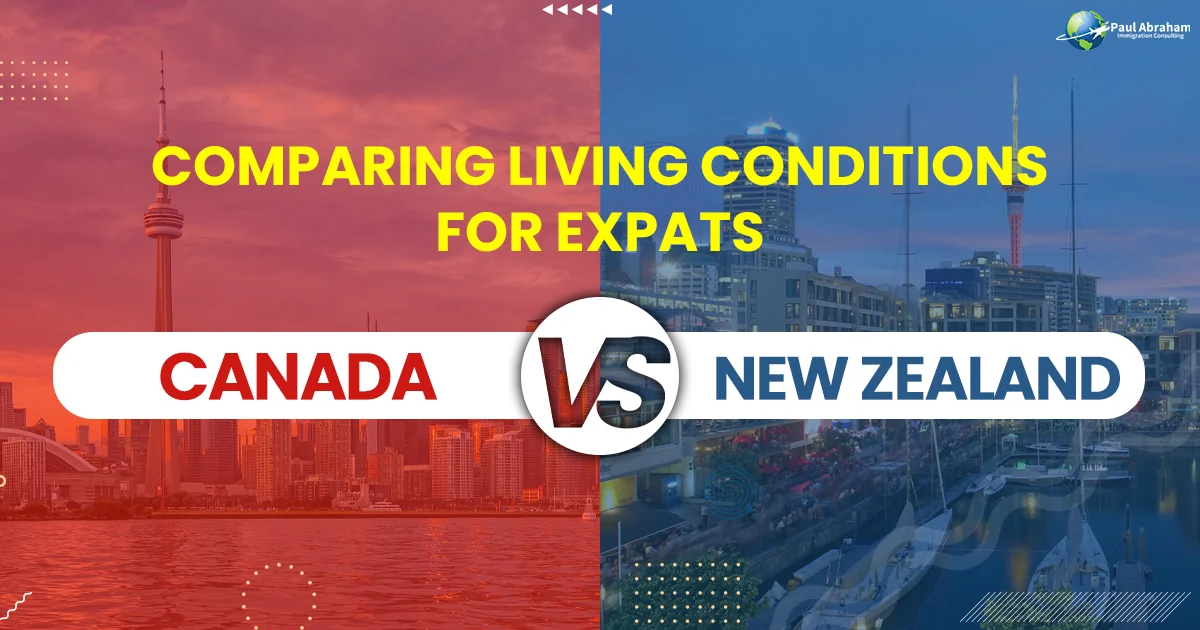8 Key Factors: Comparing New Zealand and Canada

Last Updated On : April 05 , 2024
Choosing between immigrating to Canada or New Zealand is a challenging choice, as both of these countries have excellent job opportunities and are often considered.
While the standard of education in both nations is comparable, Canada holds a slight edge over New Zealand in this regard. Furthermore, educational Universities in Canada are more affordable than their counterparts in New Zealand.
Exploring Canada
Canada, renowned for its vast landscapes and diverse cultures, is home to approximately 39 million residents as of early 2024. With a strong economy and a nominal GDP of around US$2.1 trillion, it stands as one of the world's economic powers.
The cost of living varies across the country, it is generally affordable compared to other developed nations, with an estimated average monthly expense of CAD 1,450.8 per person excluding rent.
This harmonious blend of economic prosperity and quality of life makes Canada an attractive destination for individuals seeking Canada citizenship.
Exploring New Zealand
In 2022, New Zealand's population is anticipated to reach approximately 5.12 million, while Canada's GDP for 2023 is estimated at around $2.117 trillion, underscoring its status as a highly developed economy.
Despite challenges like global inflation and domestic events such as Cyclone Gabriel, New Zealand is forecasted to achieve economic growth of 2.16% in 2022. However, the cost of living remains relatively high, with estimated monthly expenses for a family of four excluding rent around NZ$8,965.
Pros and Cons of living in New Zealand vs. Canada
|
New Zealand |
Canada |
|
Pros:
|
Pros:
|
|
Cons:
|
Cons:
|
Average working hours in New Zealand vs. Canada
- New Zealand men work an average of 37.5 hours per week and women work 31.32 hours per week. Working hours generally cannot exceed 40 hours per week, excluding overtime.
- An average Canadian working hours is 1,702 hours a year.
Is New Zealand more expensive than Canada?
Yes, but the cost of living can vary depending on origin, and although it is commonly reported that consumer prices in New Zealand are slightly higher than in Canada, rental prices in New Zealand are significantly higher.
Regional Skill Shortage List (RSSL) vs. Provincial
|
Feature |
Regional Skill Shortage List (RSSL) |
Provincial Nominee Program (PNP) |
|
Occupations Listed |
Excludes occupations on the Long Term Skills Shortage lists. |
May encompass a broader range based on provincial demand. |
|
Flexibility |
May be regularly updated to reflect changing regional needs. |
Updates depend on provincial polices and labor market changes. |
|
Purpose |
Identifies regions with immediate shortages of skilled workers. |
Varies by provincial addressing specific local labor market needs. |
|
Application |
Used for Essential Skills work visas. |
Utilized for provincial nominee programs and other local immigration strategies. |
|
Scope |
Focuses on regional level shortages. |
Addresses provincial-level needs and may include more specific occupation. |
Skilled Migrant Category (SMC) vs. Express Entry Canada
SMC: New Zealand's SMC is designed for skilled workers who have the qualifications and experience to contribute to the New Zealand economy.
Express Entry: Canada's Express Entry manages applications for permanent residence for skilled workers and is known for its fast processing time.
English Language Options: Te Reo Māori vs. French
Te reo Māori: It is one of the official languages of New Zealand, with efforts being made to increase its use and proficiency.
French: Along with English, French is an official language of Canada and is a requirement for some immigration programs.
Immigration Authorities: IRCC vs. INZ
IRCC (Immigration, Refugees, and Citizenship Canada): the federal department overseeing immigration to Canada is IRCC.
INZ (Immigration New Zealand): INZ administers the country's immigration rules and visa applications.
Immigration Processing Time
Canada: Processing times may vary, but Express Entry's target Canada visa processing time for skilled workers is six months.
New Zealand: Entry of migrants into New Zealand will take longer than Canada, however for NZ visa processing times vary depending on the visa category.
Immigration Fees Comparison
The total fees for Canada immigration is starting range from $1,000 to $5,000 CAD. And it depends on the various type of programs
The complete fees for New Zealand immigration depends on various types of visa application typically ranging from NZ$1,000 to NZ$5,000.
Geographic structure: Canadian provinces and territories vs. New Zealand territories
Canada: Consists of 10 provinces and 3 territories, each with its own government and immigration policies.
New Zealand: divided into 16 regions, which are the primary administrative divisions.
Conclusion
Selecting between immigrating to New Zealand or Canada depends on various factors like: (Age, language proficiency, job opportunities and cost of living). Therefore, extensive research and professional guidance is necessary before making a decision.
If you are considering Canada we highly recommend the services of Regulated Canadian Immigration Consultants (RCIC). Our RCICs can guide you in setting up your application, filling out the forms, verifying documents, representing you with immigration authorities such as the Canada Border Services Agency, and providing the necessary assistance and guidance throughout the immigration process.
